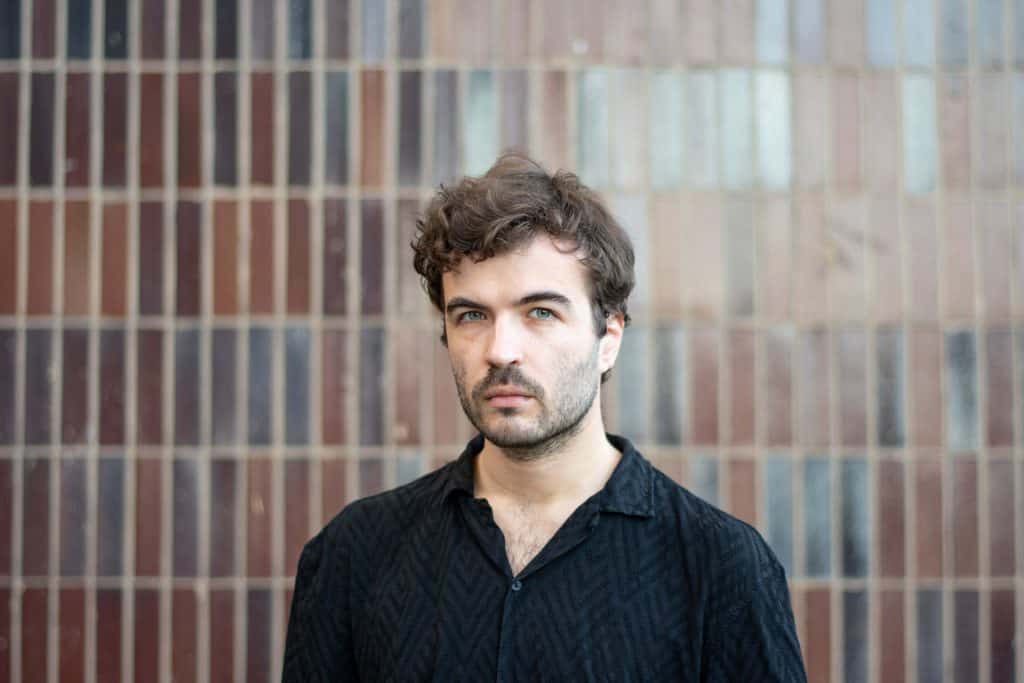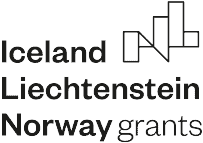In March 2023, author Michal Tallo spent a month-long residency in Stavanger, Norway, working on a new book of prose. In September of the same year, he returned to Stavanger, where he participated in two events of the festival of literature and freedom of speech called Kapittel as part of the Epic Residencies mobility. In addition to participating in the panel “Dreaming in strange houses” with Juliana Sokolová, Eva Luka and Jakub Stachowiak, he was a guest, together with Norwegian author Marjam Idriss, in the important debate “After the Attacks” on navigating public debate and the possibility of hope after the attacks on queer spaces at the London Pub in Oslo and the Bratislava Teplarna.
In an interview with Dominika Moravčíková, Michal Tallo discusses his experiences in Norway, the importance of changing the environment and his perspective on current events in Slovakia.


You have recently returned from your Epic Residencies mobility, during which you performed at two Kapittel Festival events in Stavanger, Norway. You also spent a month-long residency in that city in March this year. Was the city different in September compared to March? What was it like to experience Stavanger during a major literature festival?
A strange experience, as if I had visited two completely different cities, each beautiful in a different way. But it’s not the weather or the city itself, as much as the rhythm of my spring and autumn functioning within it – whereas in the spring I made a conscious decision (because I felt it was essential to my mental health and ability to create) to spend the residency in an antisocial way, so to speak, to meet no one, to spend most of my days in silence walking, watching the sea, reading, writing, thinking and cooking, the September festival visit was, on the contrary, extremely social, practically a series of countless meetings and conversations with a lot of great people. Both were therapeutic and beautiful, fortunately it worked out just right, that while in the spring I needed to recharge my batteries with silence and solitude, in the autumn, on the contrary, I found the company of people refreshing. I will draw from both visits for a very long time.
During the Dreaming in strange housesevent you also talked about your sleeping and dreaming during your residency in Stavanger. As a result of the changed regime at the residency, your stories have also become quieter, or less tense and anxious – although they still belong to the collection of dark stories you are preparing for book publication. Do you think the thesis that a creative residency changes the trajectory of a work in progress and significantly affects its outcome is valid in your case?
After all, darkness and calm are not mutually exclusive; often it’s quite the opposite, they can – whether ominously or pleasantly – complement each other. Anyway, to your question – yes, this is one of the main reasons I seek out residencies and participate in them as often as possible. With the exception of my debut, all of my books have been produced at them so far. For each of them, I feel that such a temporary excursion to a different, more or less alien place, which naturally completely changes one’s daily rhythm and contexts of thinking, has refreshed them, expanded them and moved them in the right direction.
“Like every society, Norway is still dealing with serious problems of hatred, discrimination and all kinds of prejudice.”

At the event, he presented his short story “A Sudden Moment of Darkness ” from his forthcoming prose book. Does a short story about a solar eclipse have anything to do with your experience of the rhythm of day and night, light and darkness in different regimes and countries? During the discussion you also talked about your insomnia and short sleep intervals…
I confess that in the case of this particular short story, I’ve never given it much thought, but it’s likely that the experience of day and night enters into it subconsciously. When I printed out the manuscript of my forthcoming book a few days ago and tried to arrange the stories in a meaningful way, I became fully aware of the essential place – without that being my initial intention – that the moments of waking, falling asleep and travelling have in them. The overwhelming majority of the texts take place either freshly upon waking or in moments when a character is unable to fall asleep (I thus unconsciously bestowed my own insomnia on several of the book’s characters). The sudden moment of darkness paradoxically breaks out of this pattern, but the passage – or, conversely, the end of the passage – of both daily and human time is nonetheless strongly present through the eclipse.
The second event you spoke at was called After the Attacks and was an important discussion of the authorship of literature after the attacks on queer spaces in Bratislava and Oslo. You spoke with Norwegian author Marjam Idriss about how to think about hope in the context of this violence. What did you take away from this debate?
It is difficult to summarise the impressions of this debate in a few sentences, there were many, and I freely admit that it was a very difficult debate from an emotional point of view. However, it is worth highlighting the excellently prepared moderator, Brita Strand Rangnes, who was able to ask really important and often painful questions in a wise, sensitive and empathetic way. It should also be said that the picture of Norwegian society presented by Marjam at the debate is considerably more pessimistic and much less utopian than our Central European ideas of a left-progressive Norway tend to be; like any society, Norway is still dealing with serious problems of hatred, discrimination and all sorts of prejudices. Of course, compared to what we are currently dealing with in Slovakia and Central and Eastern Europe in general, these problems may seem less immediately threatening, but that does not mean that we should not reflect on them. However, one important and positive feeling I took away from After the Attacks was that the large audience was genuinely interested in what was going on in our country, it was clear that they knew virtually nothing about the human rights situation in our region before, and the discussion had a tangible impact on them. This was also evident in the last few days, during the election weekend and immediately afterwards, when I received and still receive reports from people I met at the festival from Norway, Iceland and other countries that the After the Attacks debate has sensitised them to what is happening in our country, and that they are following the elections and the post-election developments closely (and quite horrifiedly). Perhaps this is small consolation, but it means a lot to me in the gloom of these days.
Was the audience in any way familiar with the terrorist attack on the Bratislava heating plant? I can imagine that Slovak conditions and events may be quite unfamiliar in Norway. I had a strong sense of the attack at the queer bar in Oslo, but that was probably thanks to our partner organization TOU and a colleague at Epic Residencies who shared information about the attack, as well as activist Rada Mikšík, who had visited the Norwegian bar recently before the attack. I don’t recall the extent to which the attack at the Thermal Power Plant was leaked to the world media… Do you think Norwegians and Norwegian women are more empathetic when it comes to issues of safety and equality for queer people?
The information about the attack on the Thermal Power Plant has of course to some extent also leaked to the Norwegian (or overall so-called Western) media and the public, but the equally essential part has not reached them – that is, information about further developments, especially in terms of the reactions of political representatives and the subsequent disgusting legislative steps that they have – fortunately mostly (so far!) unsuccessfully – tried to push through. This, after all, is one of the main differences between the attacks in Oslo and those in Bratislava. On the question of empathy when it comes to the safety and equality of queer people: the difference is extremely palpable; there is virtually no relevant political force in Norway, even on the right side of the spectrum, that openly questions the rights of LGBTQIA* people. For me personally, every visit to Norway is extremely therapeutic, among other things, with the intense feeling that as soon as I step off the plane, I can be myself for a while – that is, until I return to Slovakia, which I can no longer call home – to breathe, think, feel, speak completely freely.


I understand. I hope you will be able to return to your new home in Norway or other countries often. Did you bring any new books or props back from Stavanger?
Since after the spring experience with repeated loss of luggage on the way there and back and endlessly delayed planes (hello Scandinavian Airlines, ZSSK of Northern Europe!) I travelled light this time for safety, with only a carry-on rucksack, and I travelled back just as lightly, so strategically I did not make any major purchases this time. So I only brought a few small things, exactly the same as I brought in the spring – deliberately these are things that can be spent (coffee from a local roaster, Norwegian lip balm) – it’s my private magic ritual, an attempt to return to the place again. After all, it’s no coincidence that I finished my spring lip balm two days before returning to Stavanger in September.
Michal Tallo is a Slovak poet, writer and translator. He is the coordinator of the poetry prize Básne SK/CZ and the editor-in-chief of the poetry edition Lentikular published by Brak. He has published three books of poetry – Antimita (2016), Δ (Delta, 2018) and Book of Darkness (2022). His poems have been translated into several languages and published in various foreign anthologies and journals; a Ukrainian translation of his debut Antimita was published in 2018 by Krok (Antimність; translated by Oleksandra Kovalchuk). Michal Tallo regularly publishes poetry, prose, reviews, essays and translations of contemporary British and North American poetry in various Slovak and Czech journals. Since 2019, he has been running a translation series in the journal Glosolália, in which each issue introduces Slovak readers to different faces of contemporary young queer poetry. In 2020, Michal Tallo was nominated for the international Václav Burian Prize for Poetry. His most recent work is a translation of two collections by the acclaimed British poet Andrew McMillan – Physical and Playtime, published in one volume by Literárna bašta – as Telo / Playtime in July 2022. Read about Michal Tallo’s work and activities on the Slovak Literary Centre website.
Interview conducted by Dominika Moravčíková
Collaboration:Laura Kristína Priatková
The Epic Residencies project is made possible by grants from Norway, Iceland and Liechtenstein. The participation of authors from Slovakia at Kapittel and the translation of the work samples into English was supported by LITA – the authors’ society.






